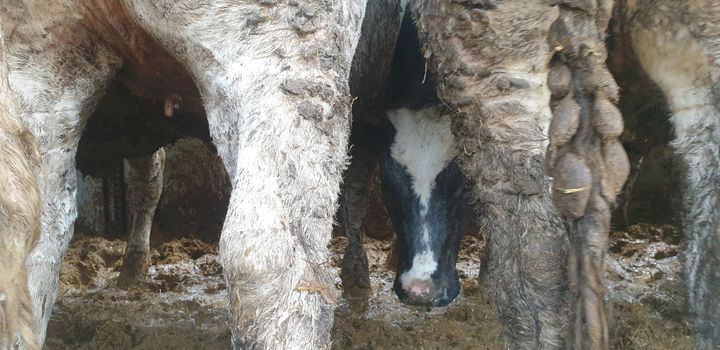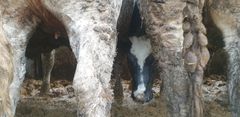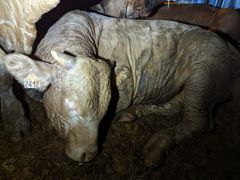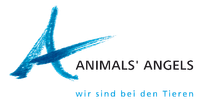An ordeal that ends on a plate in a tourist resort: Live transports of calves to the Canary Islands
9.8.2022 16:47:11 CEST | news aktuell GmbH | Press Release

The calves slaughtered on the Canary Islands come e.g., from France, Spain, Germany, the Netherlands, Ireland, or Denmark. Some already have a long-distance transport behind them, because they were brought to northern Spain for fattening when they were only a few weeks old. Others are sent directly from their country of origin on one of the longest transports within the European Union (EU). The ferry crossing from the southern Spanish port of Cádiz alone takes at least one and a half days. But before that, the animals are sometimes already on the road for days. And once they arrive on the Islands, the odyssey continues: long waiting times due to poor organisation, reloading onto smaller trucks or island hopping from the main islands to one of the smaller Canaries.
It is scientifically proven and beyond question that long-distance transports are extremely stressful and dangerous for the animals. The situation becomes particularly dicey when the temperatures are high. Due to the lack of space in the vehicles, the animals have no chance to move away from each other and to regulate their body temperature. Usually, they also have no opportunity to lie down, and if they do, the risk of injury is high because they are easily trampled by the others. Thus, being forced to stand, the constant movement on the swaying ship quickly leads to total exhaustion. Added to this are thirst, hunger and the acrid ammonia smell of their urine and faeces.
According to the EU animal welfare laws, cattle may be transported for a maximum of 29 hours, after which they must be unloaded from the truck for 24 hours to be cared for and rested in a stable. But for ferry transports within the EU, the legislator makes an absurd exception: the journey is considered as sea transport and therefore counts as neutral time which means that the time on board the ferry is not added up to the transport time. This is despite the fact that the animals have to remain on the ship in the cramped truck and ferry transport is most likely even more stressful than road transport.
In July and August 2022, the animal welfare organisationAnimals' Angels documented, together with the Spanish partner organisation ANDA, several animal transports on this route. The results of the on-site research are shocking: one dead calf, temperatures up to 39°C inside the trucks during the sea crossing, and hours of waiting for unloading after arrival on the Canaries. Trucks not even carrying a stalk of food for the animals for the crossing, as well as completely soaked and smelly bedding. Chaotic reloading of the animals at the roadside, and an onward journey from Tenerife to the island of La Palma without giving the animals a break. All these examples are violations of the EU transport regulation. The condition of the fattening farms is also devastating in some cases. On Gran Canaria, a transport takes us to a huge facility where we also meet some German calves. The barn is completely filthy, some of the animals are crowded together at over 30°C and stand ankle-deep in dung under a low iron roof. Others are exposed to the blazing sun without protection.
What also shocks us is the complicity of the official veterinarians. Because of the continuing heat wave in Spain, all these transports should have been banned. The indifference of the veterinary services is also terrible: a French official veterinarian authorized a transport from the south-east of France via Cádiz and Tenerife to the island of La Palma confirming that it would only take 12 hours. In fact, this transport took more than 100 hours.
"I am shocked every time by what 'slaughter' animals have to endure in the EU. Every transport means stress and suffering for the animals, but this route is particularly awful because of its extreme length and the high swell on the Atlantic," says Chloé Favorel, project assistant at Animals' Angels.
In their joint position paper on the revision of EU legislation on animal transport, Germany, the Netherlands, Belgium, Denmark, and Sweden call for the introduction of a maximum transport time of eight hours for all animals destined for slaughter and that the time spent in a truck loaded onto a ship should not be considered as rest time but as transport time.
We very much welcome these demands. It is high time that an end is put to the completely unnecessary and agonizingly long transports of animals destined for slaughter.
Contacts
Contact:
Julia Havenstein
Mobil: 01705577024
E-Mail: julia@animals-angels.de
Animals‘ Angels e.V.
Rossertstr. 8
60323 Frankfurt a.M.
Images


Links
About news aktuell GmbH
As wholly owned subsidiary of dpa, news aktuell provides business and organizations with effective access to media and consumers. Via the smart tools ots and zimpel, PR content accesses all media formats, including classical print, high click-rate online portals and social networks. In addition, news aktuell publishes all its customers’ PR content on www.presseportal.de, one of the PR portals with the greatest reach in Germany. By this means, all the relevant multipliers are reached globally, from editors, via digital influencers right up to specialist bloggers and interested consumers. news aktuell has been on the market since 1989. The company, with a staff complement of more than 135, has its headquarters in Hamburg. Other offices are in Berlin, Dusseldorf, Frankfurt und Munich.
Subscribe to releases from news aktuell GmbH
Subscribe to all the latest releases from news aktuell GmbH by registering your e-mail address below. You can unsubscribe at any time.
Latest releases from news aktuell GmbH
Finalists and Semifinalists for $1 Million Seeding The Future Global Food System Challenge announced3.2.2026 11:47:44 CET | Press Release
Bonn, Germany – February 03, 2026 – The Seed Grant Finalists and Growth Grant and Seeding the Future Grand Prize Semifinalists of the 5th annual Seeding The Future Global Food System Challenge (GFSC) have been announced, marking a key milestone in the USD 1 million global Challenge supporting impactful and innovative solutions to transform food systems.
Swarovski renews its Board of Directors2.2.2026 11:31:46 CET | Press Release
Swarovski International Holding AG appoints additional Independent and Family Directors
Bystronic completes acquisition of Coherent Corp.'s Tools for Materials Processing business unit, thereby gaining access to new markets in medical technology and the semiconductor industry2.2.2026 08:26:25 CET | Press Release
End of January, Bystronic announced the completion of its acquisition of the Tools for Materials Processing division of the US company Coherent Corp. and is reviving the Rofin brand.
Britt Nollé is the new managing director of PMG subsidiary X-CAGO2.2.2026 04:30:00 CET | Press Release
Continuity and growth in a single role Objective: Establishment of a global full-service network for publishers Berlin/Roermond – Since the beginning of the year, Britt Nollé has been the new managing director of X-CAGO B.V., the Dutch specialist for data and content conversion in the international publishing business. She takes over from Ingo Kästner, who held the position of X-CAGO managing director last year alongside his role as managing director of the parent company PMG Presse-Monitor in Berlin
The new World Ocean Review: Explaining life in the ocean29.1.2026 07:00:00 CET | Press Release
WOR 9 summarizes the current state of knowledge about marine biodiversity. Available free of charge, it is the ideal starting point for anyone keen to understand marine life.
In our pressroom you can read all our latest releases, find our press contacts, images, documents and other relevant information about us.
Visit our pressroom

